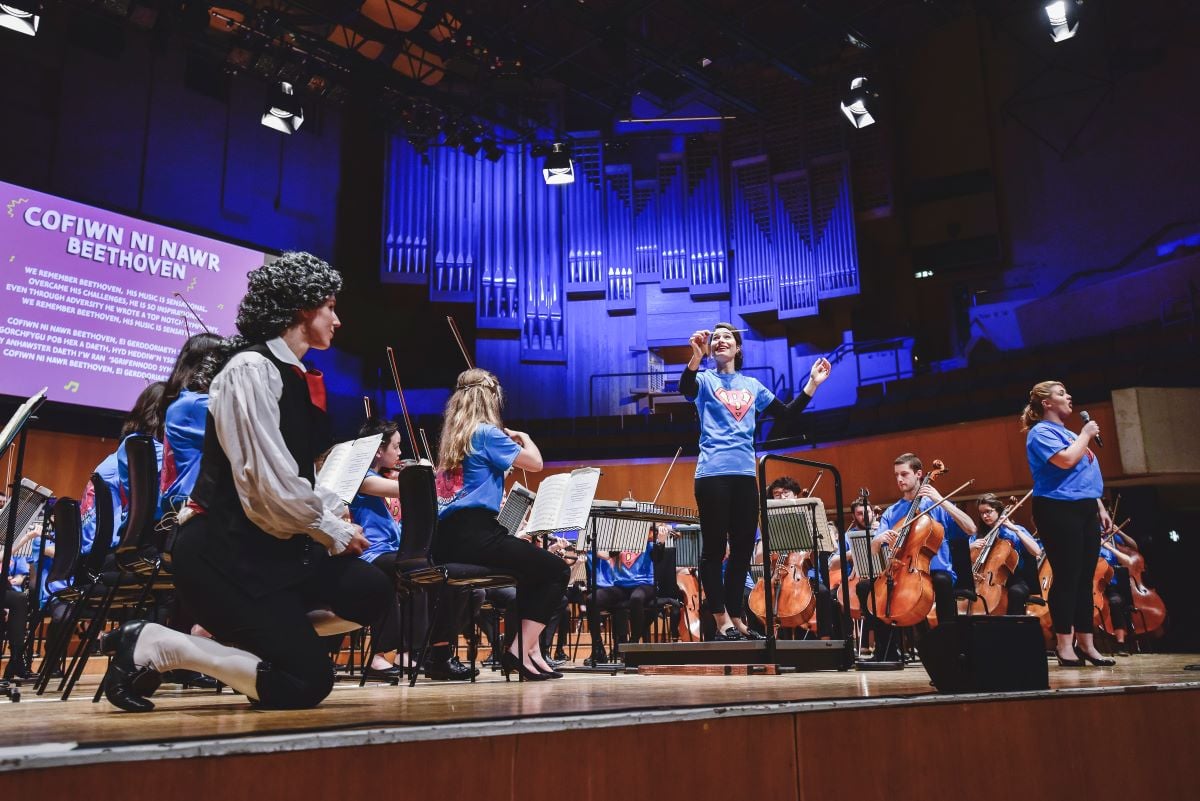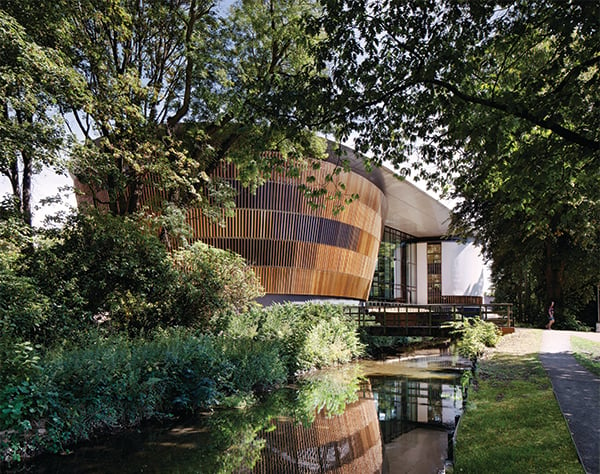
Orchestra Adventure in St. David's Hall, Cardiff
Photo: Kirsten McTernan
How to get ahead in arts management
If you don’t have industry connections, trying to break into the sector can be overwhelming. So, courses that provide work experience are in high demand. Meet Karen Pimbley (course leader) and Annabel Atkins (student).
Karen Pimbley writes:
With arts management training, it’s important to equip people entering the workplace not only with knowledge and skills, but also relevant experience to help them get ahead in the industry.
Having work experience is more likely to lead to successful graduate employment so we ensure all arts management learning at Royal Welsh College of Music and Drama (RWCMD) is delivered by current industry professionals. And, crucially, two-thirds of our training comprises work-based learning which is delivered within partner organisations.
Such partnerships can be challenging to broker and maintain and need ongoing stewardship but, having established more than fifty partner agreements over the decade the course has been running, I know there are rewards for everyone involved.
Apprentice-style approach
This apprenticeship-style approach enables graduates to hit the ground running when entering the job market. As it’s a Master’s programme we offer, the longer-term aim is to develop the next generation of arts leaders.
The students explore differing business models and the current issues and challenges of cultural leadership. They examine ways to drive positive sectoral change and continually reflect on their own authenticity and practice.
Working together with industry at every stage enables RWCMD to be at the leading edge of sector training, able to produce a guaranteed supply of work-ready talent to our partners and the wider creative industries.
 Royal Welsh College of Music and Drama. Photo: Joe Clark
Royal Welsh College of Music and Drama. Photo: Joe Clark
Annabel Atkins writes:
The creative sector is a job-search minefield. Breaking into the industry is no easy task and for a recent graduate, it can be overwhelming. I quickly came to an abrupt realisation that passion for the arts alone was never going to be enough to kickstart a career in this competitive field.
In a desperate need to broaden and deepen my understanding of the sector, I researched relevant Master’s courses. If I was going to invest considerable time and money in training, I needed to be certain it was worth it. With its 100% employment success rate, the RWCMD’s MA in Arts Management felt like the ultimate package. I haven’t looked back.
Based in the heart of a dynamic and creative city, the conservatoire-based training has broadened my networks and allowed me to collaborate with some of the best in the business. Students are given opportunities to meet, learn from and network with a variety of visiting professionals, who embody the plethora of career paths available in the sector.
Since embarking on the course, I have discovered roles I didn’t know existed; and my interests, knowledge and passions have expanded as the course has developed. If I had gone straight into an arts job, I would not have experienced these immersive and tangible experiences. It has been a steep learning curve, but I think the course has equipped me with the skills and knowledge for a successful career in the industry.
Professional placement key to success
Gaining work experience can feel impossible, nerve-wracking and like an endless cycle of rejection, especially when you don’t really know where to start. My course offers two professional placements that run alongside study which I knew would be an exceptional offer to ease me into the world of work.
From producing to fundraising, the list of placements covers a huge range of exciting possibilities tailored to each individual. It’s a rewarding experience that allows students to learn, work hard and take risks all the while having College support. It’s the world of work but in a safe bubble.
The placements have been crucial for networking and building relationships with leading sector professionals. For example, my spring placement is with an events company where I have the opportunity to explore my creativity with marketing and put my organisational skills to the test. I couldn’t have imagined getting work in such a motivating environment before, and that experience gave me insight into how to build a music festival from scratch.
Why would you want to work in the arts? Why would you NOT want to?
Many might ask why join an industry riddled with challenges? As the arts face continuing challenges of the cost-of-living crisis, difficulties with fundraising and uncertainty following the pandemic, many question whether a sustainable career in this sector is viable.
Yet, this MA has given me the tools to address some of these challenges. Access to the arts is often exclusive, making it a luxury, not a necessity. And it is no secret that the arts improve well-being. Diversity and creativity cannot be held in check; now is the time to inject new ideas and potential solutions into the sector. I am ready to make a difference.
I’d ask why wouldn’t you want to embark on a career that has the power to change the world? While it is a tough, competitive and unpredictable industry, I remain optimistic and excited at the prospect of working in a collaborative, creative industry at a pivotal time in its development.
Karen Pimbley is Head of Arts Management at Royal Welsh College of Music and Drama.
Annabel Atkins is studying for an MA in Arts Management at Royal Welsh College of Music and Drama.
![]() www.rwcmd.ac.uk/
www.rwcmd.ac.uk/
![]() @RWCMD | @KarenPimbley
@RWCMD | @KarenPimbley
Join the Discussion
You must be logged in to post a comment.